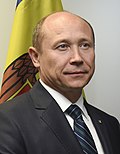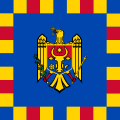| No. | Portrait | Name
(born–died) | Term of office | Political party | Prior office | Elected | Cabinet
(coalition) | Ref. |
|---|
| Took office | Left office | Time in office |
|---|
| 1 |  | Valeriu Muravschi
(1949–2020) | 28 May 1991 | 1 July 1992 | 1 year, 34 days | | Popular Front | Minister of Finance | — | Muravschi
FPM | |
|---|
| 2 |  | Andrei Sangheli
(born 1944) | 1 July 1992 | 24 January 1997 | 4 years, 207 days | | Democratic Agrarian Party | First Deputy Prime Minister | — | Sangheli I | |
|---|
| 1994 | Sangheli II |
| 3 |  | Ion Ciubuc
(1943–2018) | 24 January 1997 | 1 February 1999 | 2 years, 8 days | | Alliance for Democracy and Reforms | President of the Court of Accounts | — | Ciubuc I | |
|---|
| 1998 | Ciubuc II |
| – |  | Ion Sturza
(born 1960) | 19 February 1999 | 12 March 1999 | 21 days | | Alliance for Democracy and Reforms | Deputy Prime Minister | — | Acting | |
|---|
| 4 | 12 March 1999 | 21 December 1999 | 284 days | Sturza |
| 5 |  | Dumitru Braghiș
(born 1957) | 21 December 1999 | 19 April 2001 | 1 year, 119 days | | Independent | First Deputy Minister of Economy and Reforms | — | Braghiș | |
|---|
| 6 |  | Vasile Tarlev
(born 1963) | 19 April 2001 | 31 March 2008 | 6 years, 347 days | | Party of Communists | — | 2001 | Tarlev I
PCRM | |
|---|
| 2005 | Tarlev II
PCRM |
| 7 |  | Zinaida Greceanîi
(born 1956) | 31 March 2008 | 14 September 2009 | 1 year, 167 days | | Party of Communists | First Deputy Prime Minister | — | Greceanîi I
PCRM | |
|---|
| Apr. 2009 | Greceanîi II
PCRM |
| — |  | Vitalie Pîrlog
(born 1974)
acting | 14 September 2009 | 25 September 2009 | 11 days | | Party of Communists | Minister of Justice | — | Acting | |
|---|
| 8 |  | Vlad Filat
(born 1969) | 25 September 2009 | 25 April 2013 | 3 years, 212 days | | Liberal Democratic Party
(Alliance for European Integration) | Minister of State | Jul. 2009 | Filat I
PLDM–PL–PDM–AMN | |
|---|
| 2010 | Filat II
PLDM–PL–PDM |
| – |  | Iurie Leancă
(born 1963) | 25 April 2013 | 30 May 2013 | 35 days | | Liberal Democratic Party
(Pro-European Coalition) | Deputy Prime Minister | — | Acting | |
|---|
| 9 | 30 May 2013 | 18 February 2015 | 1 year, 264 days | — | Leancă
PLDM–PDM–PL | [2] [3] |
| 10 |  | Chiril Gaburici
(born 1976) | 18 February 2015 | 22 June 2015 | 124 days | | Independent | — | 2014 | Gaburici
PLDM–PDM | |
|---|
| — |  | Natalia Gherman
(born 1969)
acting | 22 June 2015 | 30 July 2015 | 38 days | | Liberal Democratic Party
(Political Alliance for a European Moldova) | Deputy Prime Minister | — | Acting | |
|---|
| 11 |  | Valeriu Streleț
(born 1970) | 30 July 2015 | 30 October 2015 | 92 days | | Liberal Democratic Party
(Alliance for European Integration III) | Member of Parliament | — | Streleț
PLDM–PDM–PL | |
|---|
| — |  | Gheorghe Brega
(born 1951)
acting | 30 October 2015 | 20 January 2016 | 82 days | | Liberal Party
(Alliance for European Integration III) | Deputy Prime Minister for Social Affairs | — | Acting | |
|---|
| 12 |  | Pavel Filip
(born 1966) | 20 January 2016 | 8 June 2019 | 3 years, 139 days | | Democratic Party | Minister of Information Technology and Communications | — | Filip
PDM–PL→PPEM | |
|---|
| 13 |  | Maia Sandu
(born 1972) | 8 June 2019 | 14 November 2019 | 159 days | | Party of Action and Solidarity | Minister of Education | 2019 | Sandu
ACUM–PSRM | |
|---|
| 14 |  | Ion Chicu
(born 1972) | 14 November 2019 | 31 December 2020 | 1 year, 47 days | | Independent | Minister of Finance | — | Chicu
PSRM–PDM | |
|---|
| — |  | Aureliu Ciocoi
(born 1968)
acting | 31 December 2020 | 6 August 2021 | 218 days | | Independent | Minister of Foreign Affairs and European Integration | — | Acting | |
|---|
| 15 |  | Natalia Gavrilița
(born 1977) | 6 August 2021 | 16 February 2023 | 1 year, 194 days | | Party of Action and Solidarity | Minister of Finance | 2021 | Gavrilița
PAS | |
|---|
| 16 |  | Dorin Recean
(born 1974) | 16 February 2023 | 1 November 2025 | 2 years, 258 days | | Independent [a] | Minister of Internal Affairs | — | Recean
PAS | |
|---|
| 17 |  | Alexandru Munteanu
(born 1964) | 1 November 2025 | Incumbent | 40 days | | Independent | — | 2025 | Munteanu
PAS | |
|---|



































